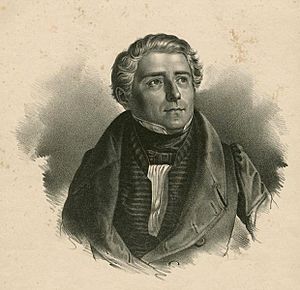Carl Loewe facts for kids
Quick facts for kids
Carl Loewe
|
|
|---|---|

Carl Loewe
|
|
| Born |
Johann Carl Gottfried Loewe
30 November 1796 Löbejün, Margraviate of Brandenburg (now Germany)
|
| Died | 20 April 1869 (aged 72) |
| Nationality | German |
| Occupation | Composer, tenor singer and conductor |
Carl Loewe (born Johann Carl Gottfried Loewe) was a famous German composer, singer, and conductor. He was born on November 30, 1796, and passed away on April 20, 1869. During his lifetime, his songs, especially his "ballads," were very popular. Some people even called him the "Schubert of North Germany" because of his talent. He wrote over 400 ballads and songs, which are still sometimes performed today.
Contents
Carl Loewe's Early Life and Career
Carl Loewe was born in a town called Löbejün in Germany. He started learning music from his father at a young age. He was a choir-boy, singing in choirs first in Köthen and then in Halle.
While in Halle, he also went to grammar school. His beautiful singing voice was noticed by a kind lady named Madame de Staël. She helped him get money from Jérôme Bonaparte, who was the king of Westphalia at the time. This money allowed Carl to continue his music education and also study theology (the study of religion) at Halle University.
Moving to Stettin and Becoming a Composer
In 1820, Carl Loewe moved to Stettin, which is now Szczecin in Poland. There, he worked as an organist and the music director for a school. This was a very important time for his composing career.
In 1824, he published his version of "Erlkönig" (The Elf King), a famous poem by Johann Wolfgang von Goethe. Some people even say his version is as good as the one by Schubert, which is more widely known. He also set many other poems to music, including works by William Shakespeare and Lord Byron.
Family Life and Performances
Carl Loewe married Julie von Jacob in 1821, but she sadly passed away in 1823. Later, he married Auguste Lange, who was also a talented singer. They often performed his oratorios (large musical works for voices and orchestra) together, and they were very successful.
He also conducted the first performance of an overture (a piece of music played at the beginning of an opera or play) by the young Felix Mendelssohn. This was Mendelssohn's "Overture A Midsummer Night's Dream" in 1827. Loewe and Mendelssohn even performed together as soloists in one of Mendelssohn's piano concertos.
Tours and Later Life
As he grew older, Carl Loewe became very famous as both a composer and a singer. When he was a boy, he had a very high soprano voice. He could even sing the difficult parts of the Queen of the Night in the opera The Magic Flute! Later, his voice changed into a wonderful tenor.
In the 1840s and 1850s, he traveled a lot, giving concerts in places like England, France, Sweden, and Norway. After working in Stettin for 46 years, he moved back to Germany, settling in Kiel. He passed away there from a stroke on April 20, 1869.
Carl Loewe was also a dedicated music teacher. One of his most famous students was Emilie Mayer, whom he taught composition. He believed she had an amazing talent. Emilie Mayer later became a successful composer in Berlin and was even called the "female Beethoven."
Carl Loewe's Musical Works
Carl Loewe wrote many different types of music. He composed five operas, but only one, Die drei Wünsche (The Three Wishes), was performed in Berlin. It wasn't very successful.
He also wrote seventeen oratorios, which are like large stories told through music, often for singers and instruments. Many of these were for male voices without instruments, or with only short musical breaks. He also wrote choral ballads, cantatas, three string quartets (music for four string instruments), and a piano trio (music for piano, violin, and cello).
His Famous Ballads
What Carl Loewe is most remembered for are his solo ballads with piano music. A ballad is a song that tells a story, often a long and dramatic one. Loewe was very good at combining dramatic and lyrical (song-like) styles in his ballads.
Some of his most famous ballads include "Erlkönig," "Archibald Douglas," "Heinrich der Vogler," "Edward," and "Die verfallene Mühle." These songs show his skill in telling a story through music.
The famous composer Richard Wagner once said about Loewe, "Ha, that is a serious German Master, authentic and true, one who uses the beautiful German language with meaning, one who cannot be sufficiently revered!" This shows how much other musicians respected Loewe's work.
Loewe's Musical Style
Carl Loewe's earliest songs were similar to music from the late 1700s. They usually had a simple tune, basic piano accompaniment, and repeated the same music for each verse of the song.
Later, he was influenced by another composer named Johann Rudolf Zumsteeg. Loewe then started to focus on and improve the ballad style in his songs. He was known for his "imaginative and, at times, daring" piano accompaniments. This means the piano parts in his songs were often very creative and used the piano's sounds in interesting ways to create a certain mood or atmosphere.
Carl Loewe's Heart
In 2012, during renovation work at the Szczecin Cathedral in Poland, something very unusual was found. Inside a pillar, workers discovered an urn (a decorative container) that was thought to contain the heart of Carl Loewe! Experts looked at old records and an inscription on the pillar. They confirmed that the urn indeed holds the heart of Carl Loewe.
See also
 In Spanish: Carl Loewe para niños
In Spanish: Carl Loewe para niños
 | Calvin Brent |
 | Walter T. Bailey |
 | Martha Cassell Thompson |
 | Alberta Jeannette Cassell |

